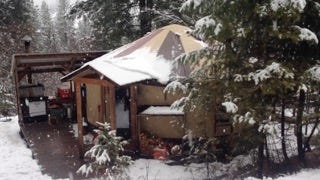Why I Live in a Yurt, Off the Grid, in Idaho; Or: The Empty Space

Everything that ever needed to happen to me happened by accident. I don't know if this is just my personality. Or if it is a deep truth that penetrates the whole world. But in my experience, intentional living isn't particularly intentional.
It's been almost five years since my husband and I closed on a little piece of bare land in the Idaho mountains. "Our little slice of heaven." We set out to be intentional, indeed. We set out to be more in touch with our real selves, and our real needs and our real capacities. It was a wild leap, but an exciting one. We had no idea what we were getting into. We spent all our money on a little chunk of land -- a bit of earth -- a meager bit of sloped Idaho mountainside, well equipped with trees and sky and clouds and sun. And not much else.
Then the rest of our somewhat outrageous plan began to unfold. That winter, my husband and his brother built us a yurt. This is a tent, but as I am fond of saying, it is less a boy-scout-camping kind of tent than an Antony-and-Cleopatra-go-to-war sort of tent. In the spring we moved our family into the tent, onto the land, and I began my off-grid life of hanging out with filthy dirty children, and learning to keep gardens and chickens and my ever-loving mind, while Nick built our entire world from scratch.
Wood shed, and plumbing lines. Shelter and showers. Goats and bees. Brick by brick over five years we built it up, this whimsical, intentional life. We hardly even knew what we were building, moment to moment. Certainly we didn't know that it would work. But this morning we looked at paint chips, for putting color on the walls of a still very small, but completely gorgeous, almost-finished home.
Before we made our leap, my husband and I spent a decade and a half making shows for the theater. We loved the theater life and it loved us, though we couldn't last in it. In those theater days I used to love a writer named Peter Brook, who wrote a book called "The Empty Space." I still live by that phrase. "the empty space." An empty space is the opportunity for creativity to be engaged. It is the space an artist holds open, ready for the muse to occupy. It's a kind of guest house for the spirit, an opportunity for beauty to show up and inhabit your life. It is one and only thing you need, to make a piece of theater.
I had a hunch, though I didn't know for sure, that it might be the one and only thing you need, to make a life.
I certainly didn't intend to go and become "The Homestead Wife." Now I make instructional videos, teaching pioneer skills. I call myself (still a little awkwardly, sometimes) an off-grid homesteader. Five years ago this was not on the radar. Let me repeat, I did not do this on purpose. Five years ago I was not just a city kid, I was an ex-country kid. That's twice as much resistance. I had fear of small towns and terrible associations with the word "self-sufficiency." I had buried my country girl soul and Western pioneer heritage so deep even I hardly knew it was there.
But I made an empty space. And what came in to fill it was an authentic call so deep and true I couldn't have planned it if I tried. I made an empty space, and what came in was simplicity, and austerity, but also a rash of beautiful, true things. This whimsical, intentional life.
We've lived a major part of these building-up years in a 314-square-foot yurt, our family of five. We certainly didn't do that on purpose. Who are you kidding? That was not intentional at all. We didn't know until afterwards what kind of closeness, and also personal strength, we'd gain from living in that kind of proximity to other human beings. We didn’t know we'd ever make it sound like it made sense. At the usual bedtime crush this evening, my daughters bumped into each other and my husband bumped into me, and he said, "Well...having a little more space will be a good thing for us," and I laughed.
I laughed because that's so obvious. It's so obvious, but we forgot it so well we had to relearn it all over again.
The empty space turns things upside down, so that they can come back in in a different order. Of course it is good for a family to have more space, more privacy, more comforts. Of course these are good things. But are they more good than accountability? Are they more good than freedom from debt? Are they more good than the power to live the way your heart says you should live?
I miss the electric crockpot more than anything, in my off-grid kitchen life. Of course a person should have a crockpot. But is it more good to have a crockpot than to have a chink in the thick wall of need and scarcity and artificial life? Is it more good to have a crockpot than to see your way out of a crush that presses so hard we all give ourselves permission to enact harm, just because we think there's no other way to survive?
I'll take the empty space. And on the other side of the empty space, all the accidents that make up an intentional life.



